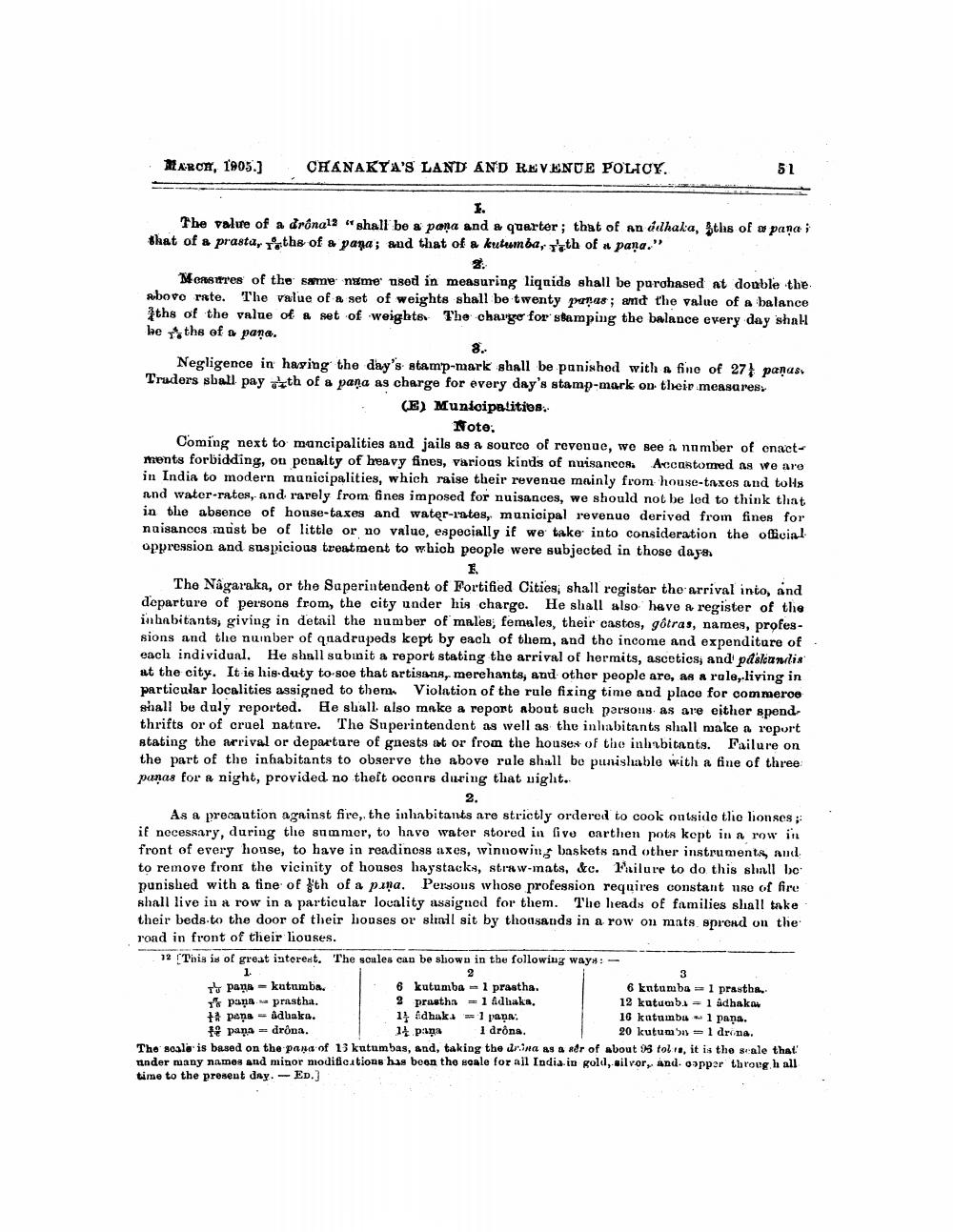________________
TARCH, 1905.]
CHANAKYA'S LAND AND REVENUE POLICY.
51
The value of a drônal2 «shall be a pana and a quarter; that of an ddhaka, Sths of w pana i that of a prasta, ths of a pana; and that of a kutumba, yuth of a pana."
Meastres of the same name used in measuring liquids shall be purchased at double the above rate. The value of a set of weights shall be twenty panas; and the value of a balance 4ths of the value of a set of weights. The charge for samping the balance every day shall he raths of paņa.
8. Negligence in having the day's stamp-mark shall be punished with a fine of 27 panas Truders sball pay 4th of a pana as charge for every day's stamp-mark on their measures.
(E) Municipalities,
Note. Coming next to mancipalities and jails as a sourco of revenue, we see n number of enactments forbidding, on penalty of heavy fines, various kinds of nuisances. Accustomed as we are in India to modern municipalities, which raise their revenue mainly from house-toxos and tols and water-rates, and rarely from fines imposed for nuisances, we should not be led to think that in the absence of house-taxes and water-rates, municipal revenue derived from fines for nuisances must be of little or no value, especially if we take into consideration the official oppression and suspicious treatment to which people were subjected in those daye.
The Nagaraka, or the Saperintendent of Fortified Cities, shall register the arrival into, and departure of persons from the city under his charge. He shall also have a register of the inhabitants, giving in detail the number of males, females, their castos, gôtras, names, professions and the nunber of quadrupeds kept by each of them, and the income and expenditure of each individual. He shall subunit a report stating the arrival of hermits, ascetics, and paskandis at the city. It is his duty to-soe that artisan, merehants, and other people are, as a role, living in particular localities assigned to thenk Violation of the rule fixing time and place for commeroe shall be duly reported. He shall also make a report about such persons as are either spend thrifts or of cruel nature. The Superintendent as well as the inhabitants shall make a roport stating the arrival or departure of guests it or from the houses of the inhabitants. Failure on the part of the inhabitants to observe the above role shall be punishable with a fine of three punas for a night, provided no theft oconrs during that night.
2. As a precaution against fire, the inhabitants are strictly ordered to cook ontsido tlie lionses; if necessary, during the summer, to have water stored in five carthen pots kept in a row in front of every house, to have in readiness axes, winnowing baskets and other instruments, and to remove front tho vicinity of housos haystacks, straw-mats, &c. Hilure to do this shall be punished with a fine of th of a puna. Persous whose profession requires constant 118e of fire shall live in a row in a particular locality assigned for them. The heads of families shall take their beds to the door of their houses or slil sit by thousands in a row on mats sprend on the rond in front of their liouses.
12 [This is of great interest. The scales can be shown in the following ways: -
'pans - kutumba. 6 kutumba - 1 prastha.
6 kutumba 1 prastha. W pana prastha. 2 prastha = 1 Adhaka,
12 kutumb. = 1 adhaka ** pena - Adhaka. 14 Adhuk = 1 para:
16 kutumbul pana. te pana - drôna. 14 pana l drôna.
20 kutumbul drona. The noal is based on the pan of 13 kutumbas, and, taking the urina as a ner of about 3 folie, it is the sale that rinder many names and minor modifications has been the scale for all India in gold, silver, and. Bopper through all time to the present day. -Ed.]




